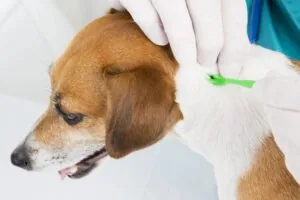Potential Warning Signs That Your Pet May Have Cancer

Cancer is the leading cause of death in dogs and in humans, with over 50% of dogs over the age of 10 acquiring the disease. Cancer is also one of the most difficult words that can fall upon the ear of a pet or it’s owner.
Because of the seriousness of this disease, we wanted to take a moment during Pet Cancer Awareness month, to look at the various causes of cancer in pets, as well as early signs that could give you a heads up if your pet is indeed suffering from cancer.
Oftentimes, early discovery can prevent cancer from becoming life-threatening, and initial treatment can also be less painful for your pet. Read on to find out causes and early signs regarding cancer to help you be more informed as a pet parent.
For those of you who may have lost a pet to cancer or know a friend who has suffered from such a loss, know that there are some ways to heal from such an event and find peace with the situation, in spite of how painful it may be. Our thoughts on comforting yourself or others who have lost a pet to cancer are also included in this piece.
Common Causes of Cancer in Pets
Genetics might play a role in whether or not your pet acquires cancer. Bigger dogs, for example, are more prone to acquiring bone cancer than smaller dogs. There are also certain breeds that have a reputation for being susceptible to cancers of various kinds, which is why, whenever you acquire a lovable furry friend, you want to find out all you can about their medical reputation and how you as their owner can help them to stay as healthy as possible!
While we do not have time to examine every breed in this article, there are some cancers that may affect any breed.
As was mentioned in one of our former blogs regarding spaying and neutering, there is some evidence that having your male or female pet neutered/spayed at a young age can help prevent them from getting certain types of cancer.
In female pets, spaying can preclude the possibility of acquiring uterine or ovarian cancer. Likewise, in male pets, neutering can help prevent the possibility of your pet acquiring testicular cancer. That being said, one can see that having a dog or cat who has not been neutered or spayed can mean that the risk for this type of cancer does exist.
Another preventable cancer in pets is brought on by sun tumors. Basically, this is skin cancer for pets. There is some evidence to suggest that animals with lighter fur or skin who end up spending much of their time outside can actually develop skin cancer. Many people are surprised when they hear their pet may have skin cancer because they think of this type of illness as a purely human phenomenon. But it is actually very possible and relatively common for an animal to get skin cancer.
The simplest preventative is to monitor how much time your at-risk pet spends outside in the sun.
This last one might come as a surprise to many, but second-hand smoke is now said to be dangerous for cats. New evidence has arisen which shows second-hand smoke being a cause for lung cancer in cats. You may want to make sure your pets are kept at a safe distance if you are in the habit of smoking, as their close proximity to smoke could be harmful. As of yet, there is no evidence to show that such smoke has an effect on dogs.
While these and other findings do help pet parents to know at least a little bit about what they can do to help prevent their pets from getting cancer, research into the causes of canine and feline cancer has not grown to the heights it has in human research. There is still much to learn, but at least some progress has been made!
Potential Signs of Cancer in Pets
So what if your pet does have cancer? How would you be able to tell?
Would he start to act sad and lethargic? Would he lose his appetite or zest for life? Would he simply continue to act normal and then suddenly act very ill out of nowhere and then when it is too late? As a pet owner, you now doubt wish to know how exactly you might be able to tell if your pet might be suffering from the beginning stages of cancer. To help you out with this, see below a fairly comprehensive list of possible symptoms** a dog may experience provided by the National Canine Cancer Foundation if he or she is suffering from cancer.
- Abnormal swellings that persist or continue to grow
- Sores that don’t heal
- Weight loss
- Loss of appetite
- Bleeding or discharge from any body opening
- Offensive odor
- Difficulty eating or swallowing
- Hesitation to exercise or loss of stamina
- Persistent lameness or stiffness
- Difficulty breathing, urinating, or defecating
If you have a feline pet, see below this list of possibly signs** that may indicate cancer, as provided by BlueCross For Pets.
- Lumps
- Non-healing sores
- Loss of appetite
- Weight loss
- Lethargy
- Weakness
- Difficulty breathing
- Limping
- Recurrent digestive problems
** Naturally, most of these symptoms can be due to other health issues, so schedule an appointment with your vet who can properly examine and diagnose your dog or cat’s individual condition.
What if My Pet is Diagnosed with Cancer?
Though cancer is a difficult diagnosis to hear, it doesn’t necessarily mean that your pet is going to die. Many cancers can be dealt with surgically, such as some breast cancers, mast cell tumors, skin tumors, and soft tissue sarcomas. Even in cases where they have advanced to a lymph node, there are options that can prolong your pet’s life and even cure him.
In addition to surgery, there are options for radiation and chemotherapy, much like with humans. There are many variables to consider, including the type, location and stage of cancer, the age and health history of your pet, and other factors. In some cases, you may be referred to a veterinary oncologist.
It’s never easy to face a cancer diagnosis, but your veterinarian will work with you so that you understand your best options, and make sure that you have all of the information needed to make these important health decisions for your pet.
Share This Post
Recent Posts
About Shallowford Animal Hospital
Shallowford Animal Hospital and The Pet Spa at Shallowford are dedicated to the exceptional, compassionate care your pet deserves. Pets hold a very special place in our families, and we treat yours like our own.



